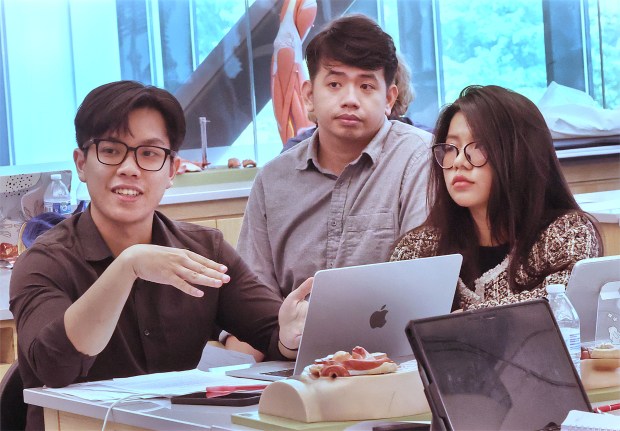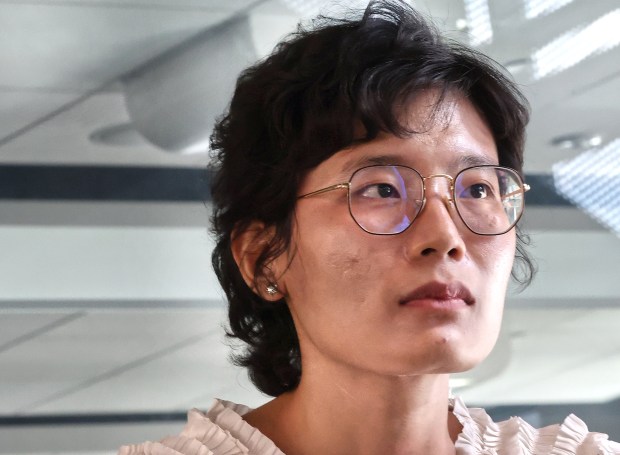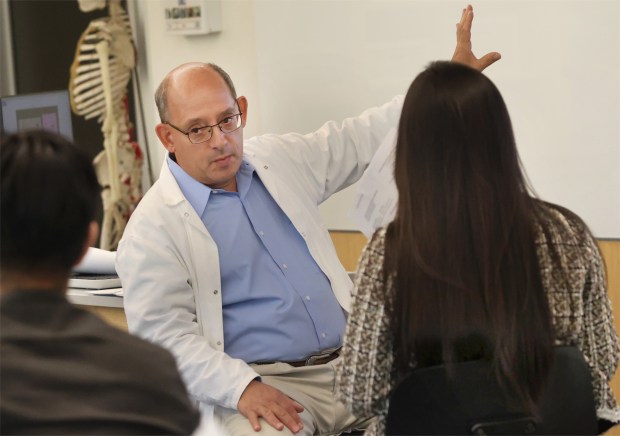A group of students gathered around a medical examiner-style table with a touchscreen monitor and virtually looked at the rib cage and spine of a patient.
“How old is this patient?” asked Ernest Talarico, assistant professor of clinical practice in anatomy and physiology at Purdue University Northwest.
Some students shout out answers, from 30 years old to 50 years old. Talarico pointed to the image and showed the students that the patient had arthritis, which typically occurs in people over the age of 50.
Then Talarico pointed to the area between the bones in the spine, highlighting how narrow the space is, which also indicates an older patient. After a few more minutes, Talarico said the patient is a 77-year-old woman.
“I cheated, though, I looked at the case yesterday,” Talarico said with a smile, to which the students laughed.
Talarico was leading 26 medical students, the majority of whom were from Vietnam, through a problem-based learning seminar. Five Purdue University Northwest students, one Indiana University Bloomington freshman, and a Lake Central High School student participated in the program, with the remaining 19 people from Vietnam.
Problem-based learning should be the focus of a medical student’s education, Talarico said, because it allows them to learn critical thinking skills.
“Basically, how to be the medical detective, which is what they’re going to be in practice,” Talarico said on Wednesday.
During the month-long program, the students spend seven days in the classroom with Talarico and the remaining days completing rotations either at St. Mary Medical Center or Methodist Hospital.
“The goal of this class is to build a better doctor so that they can go back to their country and give the patient the best care,” Talarico said. “They get exposure here that they don’t necessarily get in their home country.”
Talarico, who teaches in Vietnam, said he’s currently leading an effort to bring the standards of medical schools in Vietnam up to current standards taught in American medical schools.

For example, Talarico said the program at Purdue University Northwest teaches the students how to present a patient with test results. In Vietnam, it isn’t standardized across all medical schools that students are taught that level of patient care, he said.
In the program, Talarico said the students study various medical cases, from anatomy to radiology to infectious disease, and how to move through patient care with each case.
Cheallaigh Reardon, 18, a Purdue University Northwest nursing student, said his favorite part of the class was reviewing a case where a person comes in with a severe bone break because he learned how better initial treatment can prevent long-term care issues.
“It was interesting for me to see that and think about how I would apply that to the care in my work,” Reardon said.
Nga Nguyen, 30, of Vietnam, said one of her medical school professors in Vietnam, who is colleagues with Talarico, recommended she sign up for the Purdue University Northwest program.

Nguyen, who graduated medical school four years ago, said the program will help her build on her medical skills and knowledge, as well as bolster her resume. Nguyen said she’s enjoyed learning about reproductive systems and practicing patient interviews.
“That class is so interesting, so amazing,” Nguyen said. “It’s a lot of things, a lot of knowledge from the first year of medical school, I need to look back in the textbook again. I think that’s so helpful for me for the long term.”
akukulka@post-trib.com



